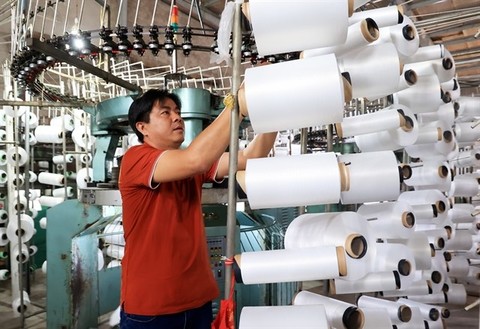
Việt Nam needs a comprehensive development plan for the industrial sector, especially in the textile, garment and high-tech industries. — VNA/VNS Photo
Việt Nam does not yet have a comprehensive and inclusive industrial development policy like developed economies do, according to Minister of Industry and Trade Nguyễn Hồng Diên.
At the minister's questions and answers session last week, many National Assembly deputies asked about implementing incentives to draw investment into the industrial sector, including the supporting and mechanical industries.
Supporting industries are considered necessary to restructure the industrial sector and promote rapid growth in a period of new development. At the same time, they will help create an ecosystem closely linking foreign direct investment (FDI) enterprises and domestic ones.
Minister Diên said that the processing and manufacturing sector, including supporting industries and the mechanical industry, has affirmed its leading role in industrial production growth.
The localisation rate has been increased in many industries. Textiles, garments and footwear have reached a 50 per cent localisation rate, while mechanical engineering has achieved more than 30 per cent.
Domestically-produced components and mechanical products have so far met 80-90 per cent of local production needs in the motorbike industry, 15-40 per cent of the automobile industry and 40-60 per cent of the agricultural machine industry.
These results have contributed to gradually reducing dependence on imported materials and spare parts and have helped develop Việt Nam's industrial sector, Diên said.
"Many enterprises in supporting industries have become suppliers to multinational corporations, participating in the global production and supply chain. The development of this sector has contributed to attracting global corporations to invest in expanding factories and forming research and development (R&D) centres in Việt Nam," said Diên.
However, the minister also frankly admitted that some domestically-produced industrial products have still achieved lower development than general growth targets. These include electronics and telecommunications products, which have met about 15 per cent of domestic demand, as well as high-tech products, which have met 10 per cent of the demand.
A member of the National Assembly said that over the years, Việt Nam has implemented many policies to improve the competitiveness of supporting industries, but currently Việt Nam still depends on FDI enterprises, which account for over 70 per cent of export value in the industrial sector.
Deputy Prime Minister Trần Hồng Hà responded that after reviewing existing policies to attract foreign investment, technology transfer and development of ecosystems that help Vietnamese enterprises participate in this supply chain are still limited.
'We must seriously review this and find out the shortcomings. When granting investment licences for foreign investors, we must also ask them to commit to using modern technology in projects in Việt Nam, and must have a roadmap on technology transfer in Việt Nam," said Hà.
Some areas that are ripe for ecosystem development include the renewable energy industry, the high-speed rail industry, urban railways and digital industries such as semiconductors. Developing these areas would help small and medium-sized enterprises access financing, especially for workforce training and market research needs.
Meanwhile, analysing the causes, Minister Diên said the State's resources for these industries are limited and they are difficult to access.
In addition, policies attracting FDI have not encouraged the development of links between FDI enterprises with domestic enterprises.
Moreover, it is difficult to find foreign investors in supporting industries and the mechanical industry, because they need large capital but have a small market. Việt Nam has also developed these two industries later than other countries, making it tough to compete.
Coordination in implementing policy between levels of authorities, sectors, agencies and businesses is also not very good, so even with development policies, enterprises may still have difficulty with access.
Key industries
Implementing the Prime Minister's Decision 68 on the supporting industries development programme, the Ministry of Industry and Trade continues to work with relevant ministries to complete policy synchronisation, including research on building the Law on Key Industrial Development. This law covers the mechanical manufacturing, processing, electronics, chemicals and energy industries, which are currently considered the foundation of Việt Nam's industry and also the driving force for the industrialisation and modernisation of the country.
“The Ministry of Industry and Trade will focus on some main areas, including spare parts and components for machinery and equipment and supporting industries for the textile, garment, footwear and high-tech industries," said Diên.
The ministry will pour resources into developing those fields, while effectively implementing preferential policies for them. It will also implement supportive programmes and activities to improve the production capacity of Vietnamese enterprises.
Focus will also be placed on training and providing a quality workforce for the businesses, especially cooperating universities and colleges in the industry and trade sector and other vocational schools, he said.
Meanwhile, to achieve the goal of producing 65 per cent of mechanical and supporting industry products for domestic demand, Diên said that aside from synchronising existing policies, the Government needs to put more resources into developing supporting industries and strengthen coordination between central and local governments to implement policies smoothly. — VNS